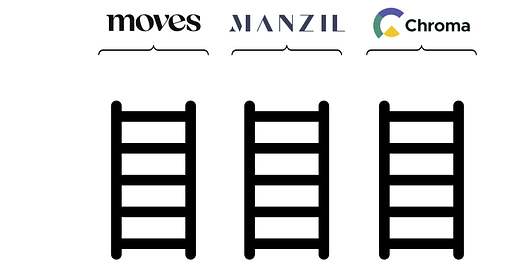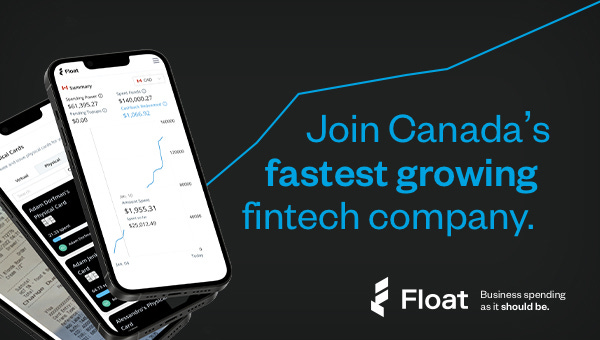Canadian Fintech: Banks & Ladders 🪜
TV celebs make M&A headlines. VCs are taking cypto mainstream. Quebec's biggest fintech lender got a little bit bigger.
Morning!
Welcome back to Canadian Fintech, a quick rundown on lending, payments & banking. If you're reading this and haven't signed up, join the 4,679 others by clicking below. Thanks 🙏
💰 Funding
OneVest, raised $5m to help fintechs launch wealth management products. The whitelabel tool is powering Neo Financial’s new Neo Invest product, which lets users with as little as $1 create portfolios in alternative assets typically only available to high net worth individuals.
VCs are dying to get traditional FIs into crypto:
HonestDoor closed $2m to become Canada’s largest home pricing data platform in Canada. The fintech crowdsources real-estate data from homeowners and public records to calculate instant home estimates, similar to Zestimates from Zillow.
Emma closed $6m to help Canadians purchase life insurance online. The company underwrites policies without the need for urine or blood samples. This has led to a decrease in the average age of a policy holder (29 years old) and an increase in the amount of pregnant women approved. PolicyMe launched competitive online insurance products last year.
Uplinq, an underwriting platform for small business lenders raised $3.5m to compete with Judi.ai.
🤝 Acquisitions
Quebec’s biggest fintech lender just got a bit bigger. Subprime consumer lender Fairstone, acquired Eden Park, a major player in the auto finance space. Ready for a quick history lesson?
Fairstone was itself acquired by Duo Bank (formerly known as Walmart Bank) in 2020.
Until 2017 Fairstone was known as CitiFinancial and was the Canadian arm of massive US bank Citigroup.
Want one more? One of Fairstone’s largest shareholders, Stephen Smith is also the owner of mortgage lenders First National & Equitable Bank.
Canadian TV celebs are making fintech M&A headlines:
Iceberg Finance is expanding far beyond auto lending with its acquisition of medical & elective surgery lender, iFinance Canada. iFinance CEO’s Dr Ann Kaplan was also on Real Housewives of Toronto.
Shark Tank investor Kevin O’Leary, is consolidating registered Canadian crypto trading firms after purchasing Coinberry for $38m and Bitbuy for $206m. Wonderfi, the rollup entity now represents ⅓ of the Canadian market.
🚀 Product
Fly now pay later. Air Canada is the world's first airline to implement Visa’s buy now pay later solution called Visa Installment. Air Canada already offers a BNPL option through Uplift, a travel focused BNPL.
Wealthsimple will start letting users invest in venture capital through its platform. Wealthsimple Venture Fund 1 is a fund-of-funds, which means that it will invest into other VC funds (not directly into companies).
In partnership with Float
If you are excited to help build Canada’s next big fintech product, the team at Float is looking for multiple Product Managers. Come join the company backed by a who’s who of fintech, including Wealthsimple’s Mike Katchen, former Shopify CFO Russ Jones, and VCs Tiger Global, Golden Ventures, and Susa Ventures. Click here to learn more.
One day you’ll look back and say “it all started when I read this article in Tal’s newsletter”...
🪜 Banks and Ladders
This week, teen banking platform Wingocard shuts down after raising $4m led mostly by Diagram Ventures. This is sad news. There is a lot to love about a financial literacy tool designed for kids.
There are 4m Canadians aged 8-18 that need financial education and guardrails on spending. I learned about overdraft and credit scores the hard way.
Banks vs fintechs: the first rung of the ladder
Consumer fintech has been a particularly strong competitor to banks when it comes to servicing niche customer groups. Fintechs are able to tailor financial products to communities that banks ignore - think non-traditional income, religious groups, low credit score, etc.
Banks on the other hand crush consumer fintech when it comes to options for the majority. They have financial products that you’ll use from cradle to grave.
To illustrate this, I find it helpful to think of banking as a ladder of services.
Think of your longest term relationship. Oh you’ve been married for 20 years? Well how long have you had a TD card in your wallet?
56% of Canadian boomers have stayed loyal to their banks since their first checking account.
Banks are able to cultivate these long term relationships by providing a ladder of services as a customer grows. They get you with a debit card in high school, then a credit card at university, then a car loan for your first job, then a mortgage when you get married, and then the cycle repeats.
Wingocard tried to own the first rung of this ladder, by providing a better service to an underbanked customer segment: teens. They were essentially building the on ramp for Canadian banking.
Their challenge was where to go next.
What does success look like for a product that deliberately stops servicing users once they age out and become financially independent?
Are these users offboarded to an “adult bank” after?
Greenlight did this in the US by whitelabeling their product for Chase. But ultimately those users will be owned by Chase, which runs the risk of the bank in-housing those features down the road.
This is unclear.
Owning the entire ladder
Moves, a banking platform for gig-workers, is a strong counter example. Like Wingocard, Moves also services a niche community much better than banks by offering relevant rewards:
5% back on gas
Portions of stock in the companies they work for like Uber & Doordash (I really love this one)
Cash advances based on gig income
The key difference between them: the financial services needs of Moves customers can continue to be met as they mature.
I can imagine Moves rolling out e-scooter loans, car loans, and even insurance products to Uber drivers as they are nutured on the platform.
Manzil is also doing this for Muslim Canadians. They offer Shariah compliant cards, auto loans, mortgages, and investments.
Chroma is also doing this for renters. They offer credit building, loans, and discounts on home internet and insurance.
These are great Canadian examples of consumer fintechs providing bank-like services for niche segments. Owning the entire ladder of services can turn a product into a brand.
In partnership with Equitable Bank
EQ Bank we are focused on driving innovation to serve the changing needs of our customers. With that in mind, we are big believers in the benefits of Open Banking.
We are pushing for Open Banking in order for Canadians to have better options and an improved customer experience with their banks. Click here to learn more about the use cases that Open Banking will offer Canadians and our point of view on how Open Banking regulatory standards can maintain or even improve the security of our banking system.
👀 Who’s hiring?
Equitable Bank, Senior Manager Enterprise Data Governance (Toronto)
Ratio, Client Success & Ops Manager (Remote)
Float, Product Manager Growth (Remote)
Klarna, Sr Product Manager Consumer (Toronto)
🐓 Tweets of the month



Liked what you read? Please forward it to a fintech friend 🤓
Interested in sponsoring? Reply to this email.










